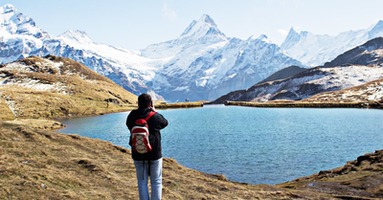
Are you ready to embark on an exhilarating adventure? Backpacking allows you to explore breathtaking landscapes, immerse yourself in nature, and experience the freedom of traveling light. If you're new to backpacking and eager to hit the trails, this beginner's guide will provide you with essential tips and insights to make your backpacking journey a success.
Planning and Research:
Before setting off on your backpacking trip, thorough planning and research are crucial. Choose a destination that matches your skill level and interests. Study trail maps, read guidebooks, and consult experienced backpackers for insights. Consider factors such as weather, trail conditions, permit requirements, and campsite availability. Create a detailed itinerary, estimate travel times, and identify water sources along the route. Research gear options and invest in quality equipment that suits your needs. Check out the Outdoor Adventures Connection for guides and outfitters that can help.
Essential Backpacking Gear:
Packing the right gear is vital for a comfortable and safe backpacking experience. Invest in a lightweight and durable backpack with proper suspension and ample storage capacity. Don't forget essentials like a tent, sleeping bag, sleeping pad, cooking stove, cookware, water filtration system, headlamp, navigation tools, and a first-aid kit. Pack lightweight and quick-drying clothing suitable for varying weather conditions. Remember to bring sufficient food and snacks, but prioritize lightweight, calorie-dense options. Switchback Travel offers this backpacking checklist.
Leave No Trace Principles:
As a responsible backpacker, it's crucial to follow Leave No Trace principles to minimize your impact on the environment. Practice proper waste disposal, pack out all trash, and avoid damaging vegetation. Respect wildlife and observe them from a distance. Stay on designated trails to preserve the natural landscape. Leave natural and historical artifacts untouched for others to enjoy. By practicing Leave No Trace, you help preserve the beauty of the wilderness for future generations. More onthe 7 Principles of Leave No Trace here.
Fitness and Conditioning:
Backpacking can be physically demanding, so it's essential to prepare your body for the journey. Start a fitness regimen well in advance, focusing on cardiovascular endurance and strength training. Gradually increase the duration and intensity of your workouts to build stamina. Practice hiking with a loaded backpack to get accustomed to the weight. Stretching before and after hikes helps prevent injuries. Listen to your body and adjust your pace accordingly while on the trail. Here's some tips on conditioning and traning from REI.
Safety Considerations:
Prioritize safety during your backpacking adventure. Share your itinerary with a trusted friend or family member and inform them of any changes. Carry a reliable map and compass or a GPS device for navigation. Stay updated on weather forecasts and be prepared for sudden changes. Pack extra layers, rain gear, and a hat to protect yourself from the elements. Stay hydrated, apply sunscreen, and use insect repellent. Be aware of wildlife and take precautions to prevent encounters.
Backpacking is a thrilling way to explore the great outdoors and connect with nature. By following this beginner's guide, you'll be well-prepared for your first backpacking adventure. Embrace the freedom, challenge your limits, and create unforgettable memories as you venture into the wilderness. So pack your bags, lace up your boots, and get ready to unleash the adventurer within you.

.png)

-(2).png)


.png)


.png)





-(1140-×-106-px).png)
.jpg)
Leave Comment Below